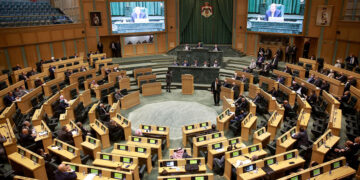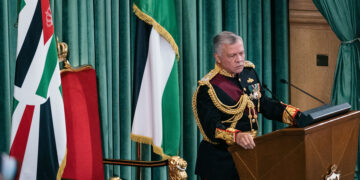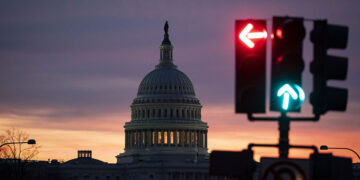Jordan's King Abdullah is scheduled to visit Washington, D.C. and meet with members of the United States House of Representatives and Senate on Saturday January 28, 2023.
(Washington D.C., January 27, 2023) – Ahead of the visit by King Abdullah of Jordan to Washington D.C. for meetings in Congress, Democracy for the Arab World Now (DAWN) urged members to ask the following questions:
- Why is the King permitting his security forces to harass, intimidate, and arrest civil society activists?
The King has weaponized Jordan's judiciary and security forces to harass, intimidate, and arrest scores of civil society activists over the past year, in what many have described as an unprecedented crackdown on civil society. The authorities have detained, interrogated, and harassed journalists, political activists, and members of political parties and independent trade unions, and their family members, and restricted their access to basic rights, such as work and travel, to quash political dissent.
In April, the government relied on its abusive "Crime Prevention Law" as a new pretext to arrest at least 150 activists, journalists, teachers, former members of parliament, and previously detained Hirak activists to prevent them from participating in planned protests. Earlier in 2022, Jordan arrested more than 200 activists, 132 of them on March 29, to prevent a teachers syndicate sit-in at the Ministry of Education Building. In April, Jordanian security forces also detained two journalists, DAWN's previous Arabic media director, Taghreed Risheq, and Palestinian writer Daoud Kuttab, at the airport. The government ultimately dismissed the complaint against Risheq and lifted the travel ban it had imposed against her, but did not compensate her for the damage it caused.
- Why is the King still shuttering the Teacher's Syndicate, despite a court order to reopen the union?
Despite the final decision of the Primary Court on June 26, 2022, ordering Jordan's Minister of Education to reopen the shuttered Teacher's Syndicate, the country's only union organized to protect the rights of the country's teachers, Jordan's government has kept in place the ban against the teacher's union. It has also taken severe retaliatory measures against teachers active in the union, including arrests of protesting teachers, malicious prosecutions of syndicate board members and forced retirements of teachers who had demanded reforms.
- Why is the King persecuting the staff of the National Council of Human Rights (NCHR)?
The Jordanian government, under the rule of King Abdullah, has brought frivolous criminal charges against the staff of the National Council of Human Rights (NCHR), the country's only quasi-governmental human rights organization, in a retaliatory effort to silence the organization for its critique of governmental abuses. The attacks against the NCHR, including the trial currently underway, take place in the context of a months-long campaign against the organization and a significant increase of repression against civil society activists throughout the country.
- How is the King going to address the serious allegations of corruption implicating the royal family, including their control of national organizations funded by international aid agencies?
Over the past year, the Jordanian monarchy has reeled from revelations of corruption and secret assets of the King and his family hoarded abroad in the Pandora Papers and Credit Suisse leaks. In addition, the fact that numerous civil society organizations that receive vast amounts of foreign aid are headed and controlled by royal family members, raise serious concerns about royal hoarding of funds meant to support civil society. These include, for example:
- Queen Rania Teacher Academy, Chairperson Queen Rania
- Royal Botanic Garden, Chairperson Princess Reem Bint Ali
- Royal Film Commission, Chairman Prince Ali Ben Al-Hussein
- Higher Council for the Rights of Persons with Disabilities, Chairman Prince Mired Ra'ad Zeid Al-Hussein
- Hashemite Fund for the Development of the Jordanian Badia, Chairperson Honorable Zain al-Sharaf Bint Naser
- When is the King going to deliver on democratic reforms he promised in 2011 in the midst of the Arab uprisings?
In the wake of the 2011 Arab uprisings, King Abdullah announced a package of sweeping reforms designed to placate protestors. Such purported reforms included free and transparent elections, comprehensive economic reforms, and respect for human rights and democracy. These reforms are still absent almost 12 years after his announcement. Instead, Jordan has only witnessed the concentration of ultimate authority in the hands of King Abdullah through constitutional reforms and repression of civil society.
- Why is the King still imprisoning his half brother, Prince Hamza, despite the absence of any charge, trial, or sentence against the Prince?
Following allegations of a coup plot against him, King Abdullah has been holding his half-brother, Prince Hamzah, under house arrest. However, this imprisonment lacks any basic measure of due process, as there have been no arrest warrants, charges, or judicial order for his imprisonment. In April 2022, Prince Hamzah recanted his royal title, explaining that his "personal convictions" were not in line with "modern methods of our [Jordan's] institutions." The King argued that his actions were meant to stop Prince Hamzah's "erratic behavior and aspirations." Prince Hamzah's imprisonment has no basis in law whatsoever and demonstrates only the absolute, unrestricted rule of the King in Jordan.
The U.S. government currently provides the Jordanian government with $425 million in military assistance and at least $845 million in budget support, in addition to $475 million in "direct cash transfer to the budget," effectively buttressing the monarchical dictatorship's increasingly tyrannical rule over Jordanians. On September 16, 2022, the State Department announced a Memorandum of Understanding extending U.S. financial support to Jordan at $1.45 billion annually for the fiscal years 2023-2029. Though the Jordanian monarchy has promised to implement constitutional reforms to democratize the country and transfer power to the elected parliament, the King has made none of the promised reforms, and instead only further centralized his executive powers.
The United States should pressure King Abdullah into enacting promised reforms and releasing prisoners of conscience currently detained in Jordan. DAWN calls on Washington to cease its military aid and assistance to Amman in light of its systematic and widespread rights abuses and King Abdullah's efforts to consolidate his personal authority over Jordan.







































